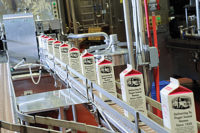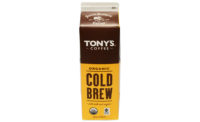Before he could focus on the business of selling milk, Scott Highland, the president of Smith Brothers Farms in Kent, Wash., had some other, not-so-insignificant business issues to take care of, specifically:
- Divest the family’s long-time dairy farming operation and the farm itself.
- Find a new reliable source of milk.
- Convert independent route drivers to company employees.
- Identify a new site for milk processing operations.
- Remodel a building to receive, process and warehouse milk.
In August 2013, Highland could at last cross off the final item on the list as pasteurized milk flowed through the fillers in a new plant.
The Milk Regulatory Equity Act of 2005 forced the company out of the dairy farming business. Smith Brothers Farms had 3,200 milk cows and 3,500 heifers. The sale meant the company had to find reliable sources of high-quality milk. The company also sold its 240-acre farm that had been in the family for more than 90 years. Converting independent home-delivery route drivers (who the company calls “milkmen”) to employees was, in part, a customer-service issue.
“All these factors were holding us back. We rose to the challenge,” Highland said. He describes the family-owned home delivery milk operation (started by his wife’s relatives in 1920) as “a 90-year start-up launch.” Before running Smith Brothers Farms, Highland managed the company’s dairy operations in the eastern part of Washington.
Proceeds from the sale of the farm along with bank loans were invested in the new processing facility, a former soup manufacturing plant. (See related article on page 90.) Highland said the company is profitable and well capitalized. The shareholders are family members.
“[The family has] made a huge investment. [The investment] is not to be taken lightly,” Highland said.
The investment is obvious. The plant is modern and efficiently laid out. An engineer in the plant said that in the former facility he was either walking over something or under something. In addition to the plant, the building houses the corporate offices. Employees have a sunny break room in one corner of the building. The president’s office, on the other hand, is a windowless room in the building’s interior.
Finally, Highland and the management team, including his son Dustin, the chief operating officer, could focus on the business of being a milk processor. The company also invited nonfamily members to serve as directors on its board.
Outside advisors have helped Smith Brothers Farms to “step up their game,” said board member Jon Gehrs of Pacific Natural Foods, Tualatin, Ore. Board members have challenged family members to see their company as a business, not just a family business. They have committed to investing in it, Gehrs said.
Dustin’s cousin, Purchasing and Facilities Manager Craig Koester, is a link to the earlier generations of the dairy operation. At age 12, he was working for his grandfather, Dan Smith, a second-generation owner and president who died in 1996. His mother was CEO for 10 years; his dad a milkman.
Koester notes how the business has become more efficient in the years since his first jobs, which included cutting the grass around the plant and filling sour cream cups by hand. Plant employees used to move pallets with a dolly. Now automated conveyors and forklifts do the heavy lifting. Milkmen kept their accounts in leather-bound ledger books that Koester’s mom would reconcile at the end of every week. Eventually, the company moved to hand-held computers. The next step is tablets, which are one-fifth the cost of the hand-helds.
Words to live by
Long before Smith Brothers was high-tech, it was high-touch. Those who deliver milk are not drivers; they are milkmen. Milkmen develop relationships with customers, said Todd Behan, the vice president of retail distribution. Customers invite milkmen into their homes and serve them coffee and cake. “The Milkman Creed” (see box on page 86) states “I delivered to your grandparents and I’ll deliver to your kids.” and “I help raise your kids and feed your dogs.” Behan estimates that the company gives out 17,000 treats a month to customers’ dogs.
Home delivery forms the backbone of Smith Brothers’ business, accounting for about half of the company’s annual sales. The high-margin business allows the company to engage with other clients, including wholesale customers, school milk distributors and co-pack accounts.
Besides milk, cream and other fluid products, Smith Brothers delivers eggs, cheese, bakery items and turkeys (during the holiday season). Monthly specials encourage trial purchase and repeat business.
Buy local, drink local
Smith Brothers serves a diverse customer base in the Puget Sound area. “They might not all buy the same things, but they have the home delivery element in common,” said Scott Highland.
Without a steady base of retail customers, Smith Brothers works hard to maintain its home delivery accounts. It requires constant prospecting and marketing. The dairy processor finds new customers by going door to door, selling at farmers markets, exhibiting at county and state fairs and participating in “mom-based” events, said Public Relations and Marketing Manager Sean Flaherty. The company has six full-time sales reps and doubles the number during its busy season.
The theme of being a local and family-owned business resonates in Seattle, Flaherty said. There is also the nostalgia for the milkman. But what gets and keeps accounts is the taste of the milk, said Flaherty and others on the management team. It’s local, fresh (48 hours “from farm to fridge,” Flaherty said) and not excessively heat-treated like a UHT product.
That’s exactly the theme the dairy processor should be sounding, said board member Gehrs. “For (the company) to be successful, they have to tell the story of where the milk comes from, that they’re a local business and that the milk is fresh, not extended shelf life,” he said.
Smith Brothers operates in a niche market and a competitive one. Grocery stores are rivals as is another home delivery service operated by Amazon Fresh, a business unit of the e-tail giant. It accepts orders up until 11 p.m. (compared to 6 p.m. for Smith Brothers) and it delivers a broader array of groceries.
To grow the business, Smith Brothers is seeking co-packing opportunities. The new factory increased capacity at least 50% and it will allow the milk processor to grow and expand by another 150%, Highland estimated.
“The new factory will help us increase business,” Highland said. “Some business will come to us, some we will seek.”
The company has picked up an organic milk account. It will find customers that are too small for large milk processors to service but are the right size for Smith Brothers. As a small processor, it can be “nimble,” Highland said, adding that “We will prepare a pallet” if that is all that’s needed.
The dairy processor will be more aggressive in the wholesale area, said Dustin Highland. The company is looking for other retailers who need milk. Management vows to focus on the core business — fresh, fluid milk — before it adds other Grade A products.
Processing fluid milk is a tough business to be in. It is low-margin, consolidation favors the larger processors and consumers are drinking less milk. Yet Scott Highland is optimistic about the future of milk and his company’s ability to compete in this landscape. “Milk is real food,” he said.
Highland might have had to re-boot a 90-year-old company but he didn’t have to re-launch milk.
The Milkman Creed
- I am a Milkman.
- I am the purveyor of freshness.
- I am a supplier of happiness.
- I am part of your neighborhood folklore.
- I help raise your kids and feed your dogs.
- I work through the night and deliver at dawn.
- I am always at your service.
- I am a farmer, a manufacturer, an accountant, a salesman. I’ve seen it all.
- I ensure you receive the best quality.
- I am as reliable as your postman, and as approachable as your neighbor.
- I delivered to your grandparents and I’ll deliver to your kids.
- I am part of your family and you are part of mine.
- I am your Milkman.
Source: Smith Brothers Farms Dairy








